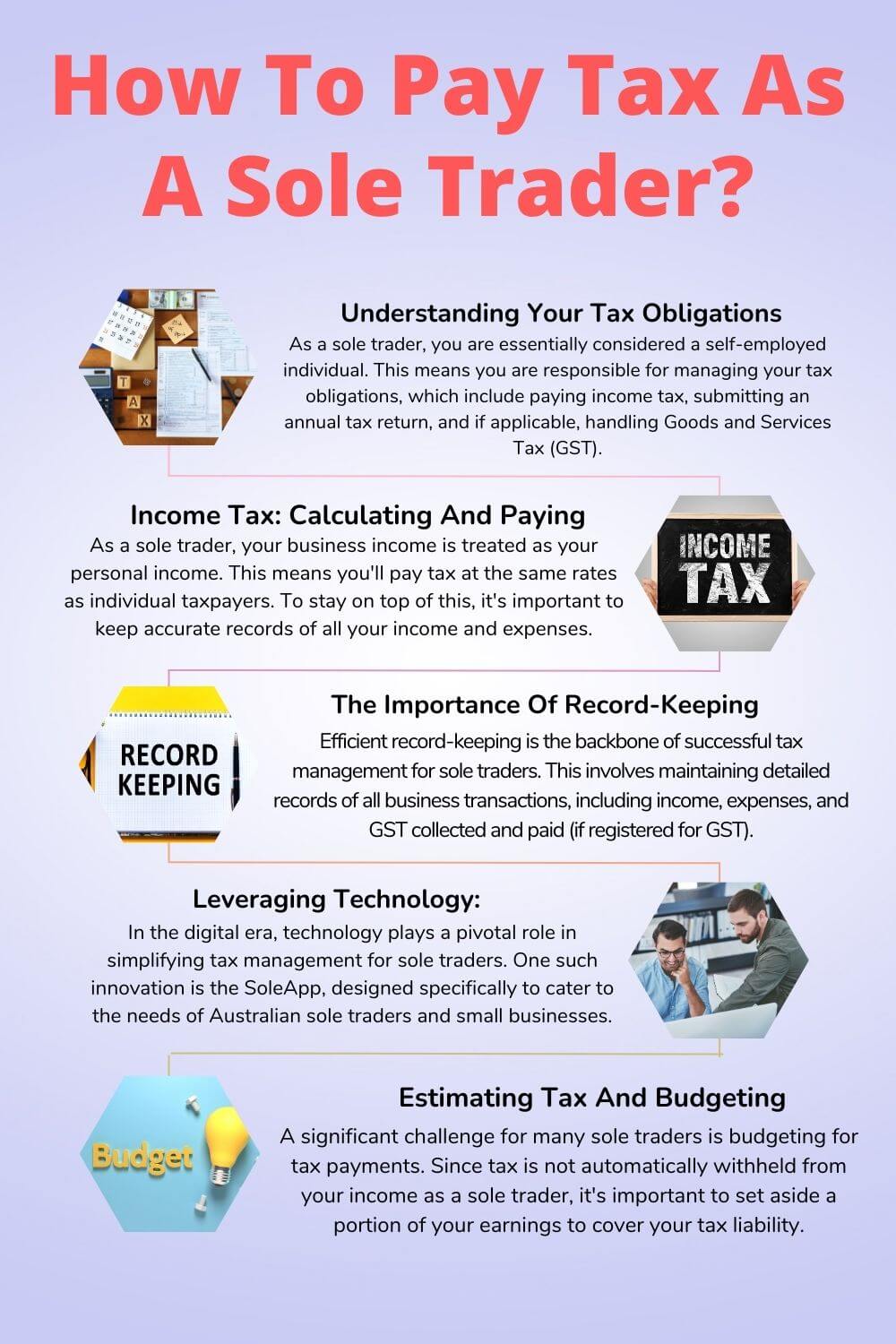Navigating the tax system as a sole trader in Australia can be a challenging task, especially for those who are new to the business world. Understanding your tax obligations and learning how to manage them efficiently is crucial for the success and legal compliance of your business. In this comprehensive guide, we’ll explore the key aspects of paying taxes as a sole trader in Australia, ensuring you have the knowledge and tools to handle this crucial aspect of your business with confidence.
Understanding Your Tax Obligations
As a sole trader, you are essentially considered a self-employed individual. This means you are responsible for managing your tax obligations, which include paying income tax, submitting an annual tax return, and if applicable, handling Goods and Services Tax (GST). It’s important to understand the nuances of these responsibilities to ensure you’re not caught off guard when tax time comes around.

Registering For An Australian Business Number (ABN) And GST
One of the first steps as a sole trader is to obtain an Australian Business Number (ABN). This unique 11-digit number is crucial for tax purposes and is used in all your business dealings. If your business earns over $75,000 per annum, it’s mandatory to register for GST. This involves adding 10% GST to your taxable supplies and lodging regular Business Activity Statements (BAS) with the Australian Taxation Office (ATO).
Income Tax: Calculating And Paying
As a sole trader, your business income is treated as your personal income. This means you’ll pay tax at the same rates as individual taxpayers. To stay on top of this, it’s important to keep accurate records of all your income and expenses. The net profit from your business will be included in your personal tax return, and tax will be calculated based on your total taxable income.
Also Read: How Mobile Invoicing Can Speed Up Your Payment Process
The Importance Of Record-Keeping
Efficient record-keeping is the backbone of successful tax management for sole traders. This involves maintaining detailed records of all business transactions, including income, expenses, and GST collected and paid (if registered for GST). These records not only help in accurate tax calculation but are also essential for compliance and audit purposes.
Leveraging Technology: The Role Of SoleApp
In the digital era, technology plays a pivotal role in simplifying tax management for sole traders. One such innovation is the SoleApp, designed specifically to cater to the needs of Australian sole traders and small businesses. This app simplifies the often tedious and complex process of accounting and tax management.

It allows you to track expenses, generate invoices, and keep an eye on your business’s financial health, all from your mobile device. What sets SoleApp apart is its focus on the Australian market, ensuring that all features are tailored to meet local tax requirements. By integrating this tool into your business, you can streamline your tax management process, saving time and reducing the likelihood of errors.
Estimating Tax And Budgeting
A significant challenge for many sole traders is budgeting for tax payments. Since tax is not automatically withheld from your income as a sole trader, it’s important to set aside a portion of your earnings to cover your tax liability. A good practice is to save around 25-30% of your income for this purpose, adjusting as needed based on your tax bracket and business performance.
Quarterly Instalments And The Pay As You Go (PAYG) System
The Australian Taxation Office (ATO) offers the Pay As You Go (PAYG) instalments system, which allows sole traders to make regular payments towards their expected tax liability. This can be a useful way to manage your tax payments, avoiding the burden of a large tax bill at the end of the financial year.
Also Read: Automating Business Reminders: Why You’ll Never Miss A Job Again
Seeking Professional Advice
While technology and apps like SoleApp can greatly aid in managing your taxes, seeking professional advice is always recommended, especially when dealing with complex tax matters. Tax laws can change, and having a professional guide you through these changes ensures that your business remains compliant and benefits from any available tax concessions or deductions.
Maximizing Tax Deductions: Smart Strategies For Sole Traders
One of the key aspects of managing your taxes effectively is understanding and maximizing your tax deductions. As a sole trader, you are entitled to deduct a wide range of business-related expenses from your taxable income. These deductions can significantly lower your tax liability and improve your business’s financial standing.

It’s important to familiarize yourself with the types of expenses that are deductible, such as home office costs, vehicle expenses, equipment purchases, and marketing costs. Keep in mind that all expenses claimed must be directly related to the earnings of your business income and need to be substantiated with proper documentation.
Navigating The Superannuation Landscape
Superannuation is another critical area for sole traders to understand. Unlike employees, sole traders are not automatically covered by the Superannuation Guarantee (SG) contributions made by employers. This means it’s up to you to plan for your retirement. Voluntary contributions to a superannuation fund can not only help secure your future but also offer tax advantages. Contributions made to a super fund can be claimed as a tax deduction, reducing your taxable income. It’s advisable to speak with a financial advisor to create a superannuation strategy that aligns with both your retirement goals and your business’s financial capacity.
Dealing With Varied Income Streams
The nature of being a sole trader often means dealing with fluctuating income. Unlike a salaried employee, your income may vary significantly from month to month or season to season. This can make tax planning more complex. It’s important to adopt a flexible approach to budgeting and tax planning to accommodate these fluctuations. Creating a financial buffer for leaner months and understanding your cash flow patterns can help in making more informed decisions about tax payments and savings. Additionally, using tools like SoleApp can provide real-time insights into your financial status, enabling better planning and management of varied income streams.
Also Read: The Beginner’s Guide To Starting A Personal Training Business
By keeping these additional considerations in mind – maximizing deductions, understanding superannuation, and managing varied income streams – you can navigate the complexities of the Australian tax system as a sole trader with greater ease and confidence.
Conclusion: Embracing Responsibility With Confidence
Paying taxes as a sole trader in Australia doesn’t have to be a daunting task. You can easily handle your tax responsibilities by understanding your tax obligations, keeping accurate records, leveraging technology like SoleApp, and seeking professional advice when necessary. Remember, effective tax management is not just about compliance; it’s a vital part of your business’s financial health and success.
Looking for an accountant to help you kick your financial goals? Sole has teamed up with Accountants Direct to provide a market-leading offer to help you manage your finances and achieve sustainable growth. Learn more about the offer here.


